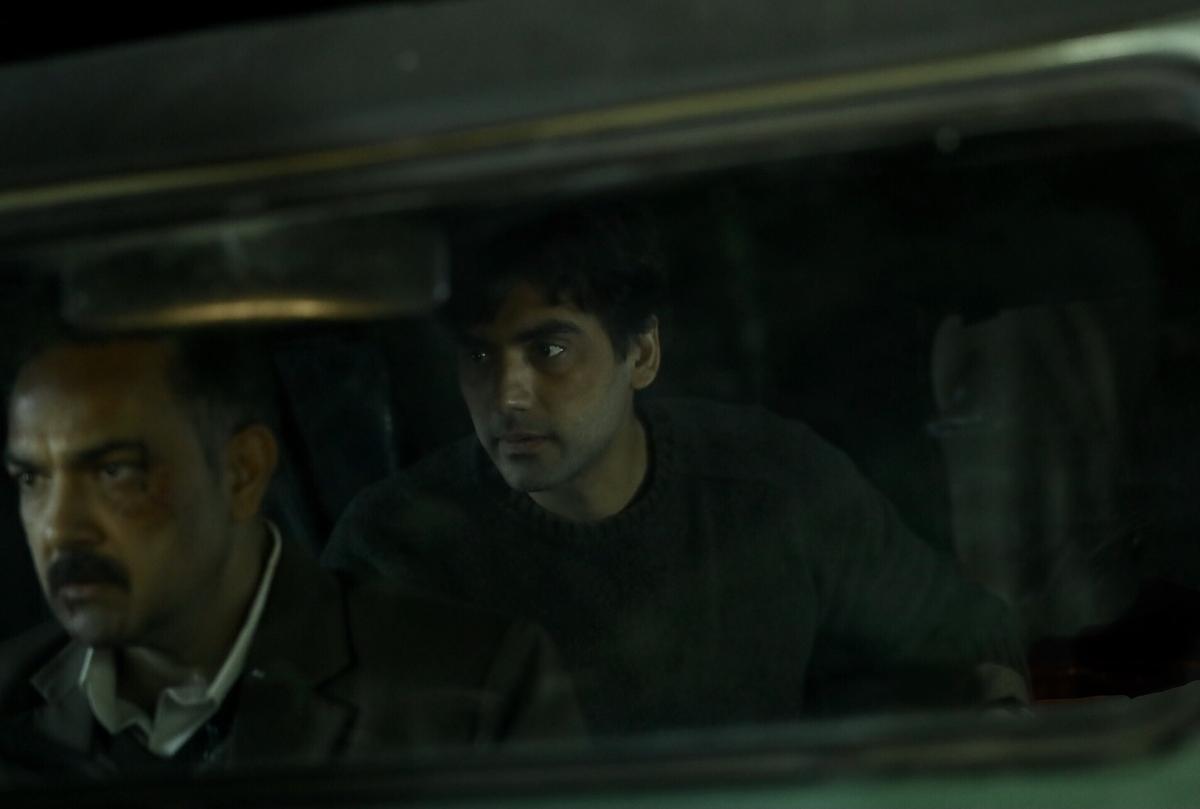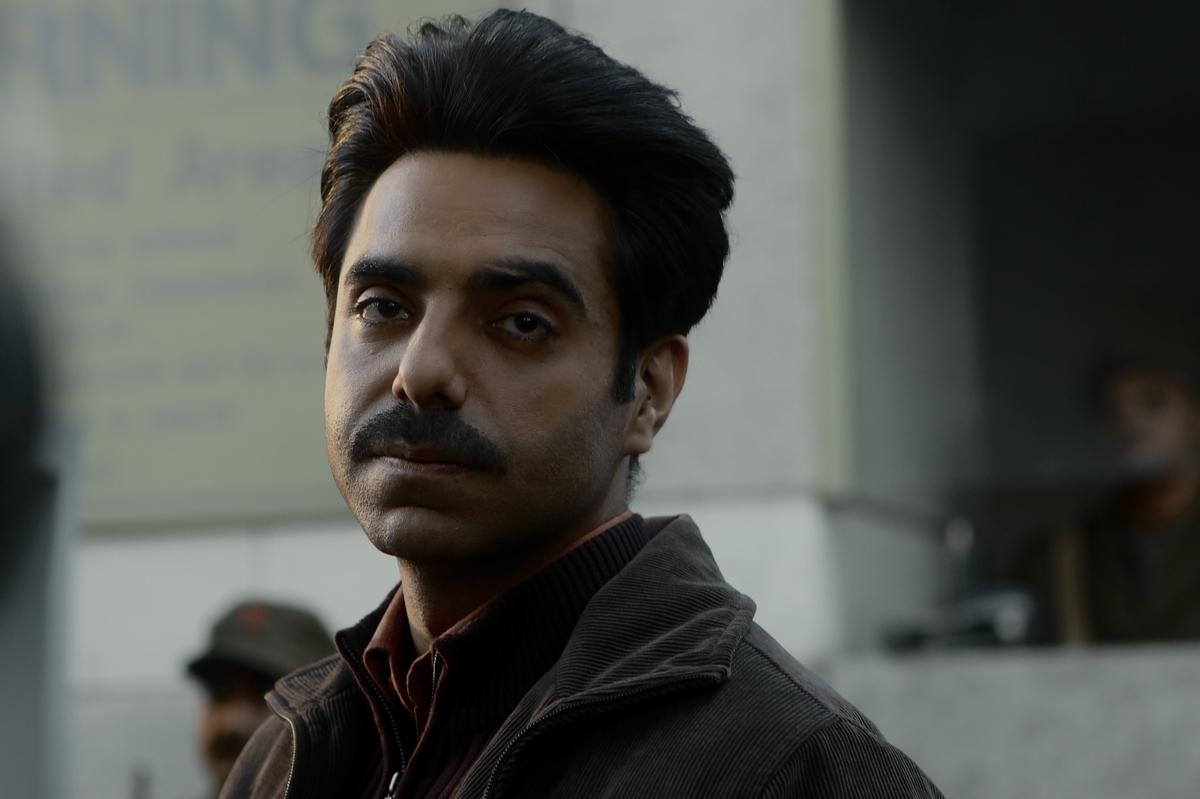Berlin is an unusual title choice for a Hindi film set entirely in 90s New Delhi. In Atul Sabharwal’s atmospheric spy drama, ‘Berlin’ refers to a café — or coffee house, as they were once known — in the national capital. Shrouded in cigarette smoke and intrigue, it is tucked away on a nondescript plaza in the city’s diplomatic enclave. The setting is winter, 1993, in the runup to Russian President Boris Yeltsin’s landmark visit to India.
Ashok, a deaf-mute waiter played by Ishwak Singh, is arrested in connection to an assassination plot. He’s held inside an imposing government building, called simply the ‘Bureau’, and interrogated by Pushkin (Aparshakti Khurana), a sign language instructor from a local school. Watching over their every move, with unblinking aplomb, is Jagdish, a sly, shifty intelligence man played by Rahul Bose.
Berlin is Sabharwal’s third feature after the cop drama Class of ‘83 (2020) and Aurangzeb (2013). He also wrote Jubilee, a lavish period series about the golden age of Indian film. The writer-filmmaker grew up in Agra, in an India that hadn’t yet shaken off its Soviet influence. English and Hindi translations of the Russian greats (Dostoevsky, Tolstoy) would be disbursed on mobile vans and vastly read by school children. “There was also a lot of Soviet science fiction and manuals on gadgetry,” Sabharwal recalls.
Doordarshan would feature Polish films — especially those of eminent director Krzysztof Kieślowski — in their late-night ‘adult’ programming. Indian popular cinema cast an equal spell in the former USSR; Disco Dancer was a rage in Moscow, and Amitabh Bachchan would be photographed shooting his shlocky superhero film Ajooba in Yalta by the Black Sea.
“Doordarshan must have had a tie-up with socialist countries because the athlete Nadia Comăneci was very popular on television,” Sabharwal says. “We would open the newspaper and see Indian politicians visiting Moscow, etc. There was a certain ‘Russo’ atmosphere, so to speak. The Soviet Union was always more in conversation than the USA.”

Ishwak Singh in a still from ‘Berlin’
Its Cold War intrigues notwithstanding, Berlin emerged from a personal space for Sabharwal. There was a time in his career, he says, when he felt trapped between institutions and forces greater than him, much like Ashok in the film. He picked up the character while hanging out at a Costa Coffee in Mumbai, which employed deaf-mute waiters. Sabharwal combined these prompts with his childhood memories and the astringent spy cinema of England and America.
“Alan J. Pakula’s Watergate time paranoia thrillers like The Parallax View and All the President’s Men were an influence. I also just love the look and feel of John le Carré TV adaptations. The characters in those shows look like diplomats and officials I have seen.”
A chat with Rahul Bose
On playing a spymaster in Berlin
I have met a couple of folks from the intelligence community. To be frank, they are extremely boring people. They are very tight-lipped and secretive, as is their prerogative. They are not actors, so they don’t have a facility with words or suggestions. In cinema, however, we can use these tools to pull the audience into a web of intrigue. What makes spies fascinating, I think, is not so much their personalities but the situations and motives guiding their actions. “I went the next day, and he wasn’t there…” – that’s the hook!
On acting in a chamber drama
Atul had skilfully indicated to us the sense of claustrophobia that would envelop this film. There was no escape, both physically, in the space that we were shooting in, and in terms of plot. There was also the period — the early 90s — which meant there were no mobile phones or easy modes of escape. There was a sense of being nailed down by your surroundings and your circumstances that we actors had to convey.
Berlin foregrounds the brutalist architecture — angular geometric shapes, hard straight lines, exposed concrete — of old Delhi government buildings. The film is shot by cinematographer Shree Namjoshi; Ashok Lokare and Sandeep Shelar did the production design.
“A lot of the New Delhi Municipal Council (NDMC) administered parts of the city were constructed like that,” Sabharwal says. Places in Sarojini Nagar and in Chanakyapuri like The Ashok Hotel, Akbar Hotel, Chanakya Cinema. There was also the Hall of Nations building in Pragati Maidan which is now broken down.”

Aparshakti Khurana in ‘Berlin’
While not a silent film, Berlin often plays like one. The film’s leads, Ishwak and Aparshakti, workshopped in sign language in Mumbai for months. They also interacted with people from the deaf-mute community in Dongri. “The whole process was so organic that signing just went into my system,” Aparkshati says. It got to a point where the actors could improvise in sign. “That was the whole idea for a film like this,” Ishwak smiles.

Reading the script of Berlin, Aparshakti was intrigued by his character being named Pushkin, after the 19th-century Russian poet and playwright, but was advised not to read too much into it. “Pushkin Verma, in the film, is a humble, subdued school instructor,” the actor says. “Because the plot revolves around the possible assassination of the Russian President, Atul wanted the name to add another layer to the story. I remember asking him if there was something more I should know. But it’s just one of those details that add to the richness of a film.”
K (Krishna Kumar), the Chennai-based composer of Yuddham Sei, Aandavan Kattalai and Thuramukham, supplied the score for Berlin, while Anthony BJ Ruban is the sound designer.
“Because the film is about a deaf-mute character and his memories, we wanted a soundscape that is non-intrusive yet suspenseful and entertaining,” Sabharwal says. A reference by contrast was Walter Murch’s work on The English Patient (1996), which stitches through sound and music its protagonist’s memories across two timelines.“ I asked Ruben, ‘How do we achieve the opposite of that? What do memories feel like in the absence of sound?”
Berlin played at the Red Lorry Film Festival in Mumbai. It is is being shown at the Habitat Film Festival in Delhi on May 3.